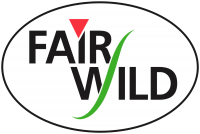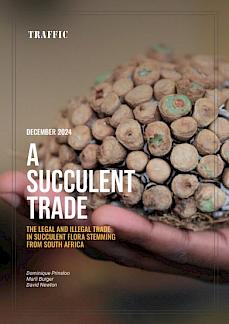

a fair deal for wild plants and harvesters
The FairWild Foundation was established in 2008 to promote the sustainable use of wild-collected plant ingredients in trade and ensure a fair deal for the communities who harvest them. TRAFFIC is one of its founding partners and continues to take an active role in its application and growth throughout the world.
The demand for wild plant ingredients is growing exponentially, posing major ecological and social challenges that often go unrecognised. Wild plant ingredients are an active, though sometimes hidden, aspect to everyday life for millions of us, whether in food and drink, traditional medicine, beauty and cosmetics or western pharmaceuticals. Such pressure on vulnerable plant species is putting ecosystems at risk, as well as the livelihoods of collectors, who often belong to the poorest social groups in the countries of origin.
1 in 5
of the world's plant species is threatened with extinction
the FairWild Standard
As a response to the concerns facing wild plants in trade the FairWild Standard and certification system helps provide businesses, operators, producers and communities with best practice guidelines on how to sustainably harvest, manage and trade in wild plants.
The Standard asseses the harvest and trade of wild plants, fungi and lichen against various ecological, social and economic requirements, ensuring that harvesting does not negatively impact either target or local fauna or flora. In addition to protecting ecosystems from negative practices, the Standard helps to ensure that the harvesters themselves receive a fair salary and ethical working conditions.
Wild harvesting of Frankincense in Kenya by the Samburu tribe. A FairWild project has helped to establish sustainable practices and help harvesting communities communities gain fair market access © Ackroyd + Harvey / Conflicted Seeds
i

Wild plants play a huge role in our daily lives, yet they receive so little attention. FairWild is working to transform the market and ensure sustainable and ethical practices are used throughout their trade
Bryony Morgan, FairWild Secretariat
where we're working so far
The FairWild Standard is being implemented throughout the world, with certified consumer products sold across Europe, Africa, Asia and the Americas.
examples of how FairWild works
sustainable supply chains
Ensuring that wild plant ingredients are traded sustainably and ethically throughout supply chains–from harvesters, processors, manufactures and retailer–is a core objective of the FairWild Foundation.
A recent TRAFFIC project in China piloted the FairWild Standard as a way of achieving sustainable trade in wild plants sourced from one of the world's most biologically diverse natural landscapes.
Drying Wolfberry Lycium barbarum, Qinghai province, during exchange site visit to learn about sustainable cultivation © Chenyang Li / TRAFFIC
i
economy and nature conservation
An ongoing TRAFFIC and WWF project called "Local Economy and Nature Conservation in the Danube Region" (LENA) is implementing the FairWild Standard across protected areas in Bulgaria, Hungary, Serbia and Slovenia.
The project brings together the preservation of traditional harvesting knowledge and the implementation of sustainable harvesting techniques, as well as helping low income communities generate livelihoods from sustainable wild plant harvesting!
baobab fruit from Zimbabwe
Baobab fruit is rocketing into consumer markets in Europe and the Americas as its wide health and nutritional applications gain increasing recognition. With a high nutrient density, including antioxidants, potassium and vitamin C, Baobab powder is becoming prized as a “superfood”.
A FairWild certification scheme in Zimbabwe is helping bring sustainably and ethically harvested baobab fruit to the market. Working with B'Ayoba, a natural ingredients company, FairWild is helping to ensure sustainable resource management and fair working conditions for a large community of rural harvesters.
Baobab fruit harvesters in Zimbabwe © B'AYoba
i
bibhitaki fruit from India
The story of the Great Pied Hornbill and the bibhitaki tree in India's Western Ghats is a shining example of how the FairWild Standard simultaneously promotes wildlife conservation and the development of local communities.
Because of its large hollows, the Bibhitaki tree, whose fruit is a key Arjuvedic ingredient, is one of the few perfect nesting places for the Great Pied Hornbill. But due to a lack of market access and capacity, local landowners saw more value in Bibhitaki timber than in Bibhitaki fruit. Thanks to a FairWild project in partnership with Pukka Herbs Ltd., the framework for sustainable, ethical and profitable harvesting of Bibhitaki fruit has so far helped protect over 600 large Bibhitaki trees, 60 Hornbill nesting sites and provide work for over 100 collectors.
A Great Pied Hornbill nesting in a Bibhitaki tree © Pukka Herbs
i
rosehip harvesting in Serbia
FairWild has been working in Europe for years, and a recently certified organisation in Serbia has successfully brought FairWild-certified Rosehip products to european markets.
Plantamell is a family-run business which works with a network of local collectors harvesting over 100 different wild plants and herbs. Rosehips from the species Dog rose Rosa canina are in high demand because of their seed oil, and the local community employed in the area is dependent on the collection and processing of wild plants such as these. The FairWild project has facilitated a resource assessment to estimate the maximum sustainable yield that can be harvested and provide the tools and guidelines necessary to ensure profitable and sustainable access to consumer markets.
A local harvester collects Rosehips in Serbia © Plantamell
i
more resources
Find out more about the FairWild Foundation, the FairWild Standard and how to join.
Interested in wild plants and their everyday uses?
related reports to WILD PLANTS trade
Explore TRAFFIC reports on the trade in wild plants and the application of sustainability frameworks such as the FairWild Standard.
Visit our resource library for the full TRAFFIC publication archive.









